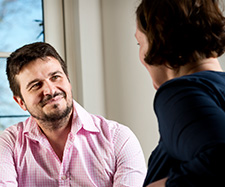What happens after a mental illness diagnosis?
 Getting a diagnosis of a mental illness brings its own unique range of feelings. It is normal to feel afraid, angry, sad, and embarrassed. A mental illness diagnosis can actually be a very positive thing: a first step towards feeling a whole lot better.
Getting a diagnosis of a mental illness brings its own unique range of feelings. It is normal to feel afraid, angry, sad, and embarrassed. A mental illness diagnosis can actually be a very positive thing: a first step towards feeling a whole lot better.
Directly following a diagnosis, you may experience both negative and positive thougths and emotions. Some common feelings following a mental illness diagnosis are:
Grief – “This is the end of life as I knew it, I have lost who I thought I was”.
Guilt – “This is all my fault, I should have sought help sooner”.
Shame – “This is so embarrassing; I hope no one ever finds out”.
Anger – “Why did this happen to me?”.
Denial – “This isn’t real, there must be some mistake”.
Hope – “Maybe now that I know what’s wrong I can begin to get better”.
Relief – “Finally I know what is happening to me, I feel good knowing it is no longer a mystery”.
You may go from feeling one of these difficult, negative emotions to feeling positive ones and you may feel many things at the same time. It can be very confusing to receive a mental illness diagnosis and that’s okay. Here are some facts to keep in mind, as well as steps to take after receiving your diagnosis:
You are not alone
This is an important thing to keep in mind. Mental illness is incredibly common: 1 in 5 North Americans live with a mental illness.
Learn about your diagnosis
Read as much as you can about your diagnosis. Seek out reputable sources like books and mental health organization websites, as well as personal testimonies that can be found on online message boards.
It is up to you who you tell
Disclosure is completely personal – you can choose to tell many people about your diagnosis or you can tell no one. You do not have to tell people right away, you can wait until it feels right and appropriate.
Understand your treatment options
Just because your diagnosis is medical, does not mean your treatment needs to be medical too. For some people, medication is an important part of their treatment, for others, talk-therapy is enough.
Engage the help of professionals
Whichever road you take, it is important to get help. Your EAP can provide you with counseling and educational services for you and your family.
Build a social support network
Whether you feel totally hopeful and relieved about your diagnosis or are troubled by it and feel scared, you will need support outside of just your therapist, counselor or doctor. Whether it is family or friends or an entire community online, you will need people who are aware or even know first-hand what you are going through to help you navigate the ups and downs of your condition.
Although it can be scary and overwhelming, a mental illness diagnosis does not define you: you are not your diagnosis, you are one of millions of people living with a mental illness. Focus on the positive: you probably sought professional help because something didn’t feel right. Now that you know what’s wrong, you can begin to change it.
